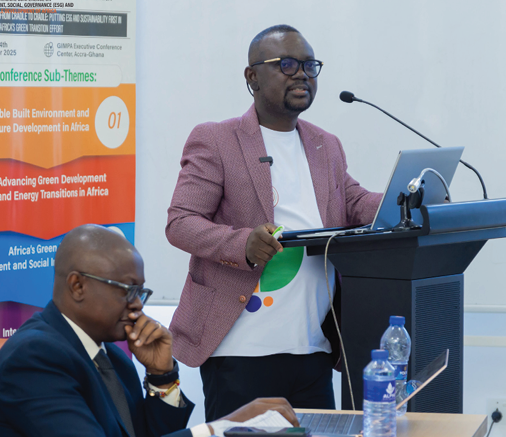Copyright thebftonline

The 2025 International Conference on Environment, Social, Governance and Sustainable Development (ICESDA 2025) has been held in Accra with a focus on climate action, inclusive development, and environmental, social, and governance (ESG) integration. The two-day event, theme “Partnerships for Sustainable Progress”, brought together over 400 participants, including academics, policymakers, business leaders, youth, and sustainability experts from across Africa and beyond. The ICESDA 2025 focused on how African countries can strengthen ESG principles to support inclusive growth and the achievement of the Sustainable Development Goals (SDGs). It aimed to foster strong dialogue, knowledge sharing, and collaboration among government, academia, and the private sector. Participants described it as a wake-up call for the continent to move beyond speeches and turn its many sustainability plans into visible results. Key insights and reflections Several key insights emerged from the discussions. First, the participant noted that while Africa’s green economy has the potential to become its largest source of jobs by 2030, only 15 percent of its countries currently offer incentives for ESG-aligned investments. They called for policy reforms and more local innovation to unlock this opportunity. Second, the issue of environmental degradation from illegal mining (galamsey) and weak governance was highlighted, with a call for stronger enforcement and community-driven restoration efforts. Third, fragmented ESG implementation was identified as a major barrier. Participants said, many African nations still face weak institutional capacity and poor coordination. They called for a unified regulatory frameworks, reliable data systems, and digital tools to measure and scale ESG impact. Fourth, they stressed the importance of women and youth inclusion– describing them as key drivers of sustainable change. They however noted that low participation in decision-making continues to slow progress, urging intensified leadership programs and financial support targeting young people and women. Fifth, technology was discussed as both a solution and a concern. Artificial intelligence (AI), participants said, offers new opportunities in education and sustainability but must be used ethically and responsibly to avoid misinformation and addiction. Lastly, the conference celebrated cultural innovation, with the use of Adinkra symbols in “Adinkratecture” recognised as a creative way of teaching ESG and SDG principles through African heritage and local wisdom. Recommendations The participants outlined nine key strategic recommendations to move the continent forward. They urged the continent’s governments and institutions to strengthen ESG regulation and metrics by developing continental frameworks and shifting from compliance-based governance to leadership rooted in ethics and responsibility. They also emphasised the need to empower universities and research institutions to lead innovation and evidence-based policymaking, while building capacity to adapt global standards to local realities. In addition, they called for stronger efforts to advance climate action through cross-sector collaboration, more climate finance, and incentives such as tax breaks and innovation grants for the private sector. Also, they encouraged stakeholders to promote inclusive development by mainstreaming gender equality and empowering women and young people as key leaders in climate and ESG efforts. To improve communication and education, they recommended that African countries leverage cultural and technological tools- including local traditions and digital media to promote sustainability awareness and ethical use of AI. They further called for better stakeholder engagement and communication strategies, suggesting that media, civil society, and community leaders should be key partners in spreading sustainability messages and encouraging behavioral change. Another major recommendation was to establish sustainability desks in both public and private institutions to coordinate ESG activities, track progress, and promote internal transformation. Moreover, the conference proposed the launch of a Pan-African ESG advocacy program to promote awareness, engage youth and traditional leaders, and influence public policy on sustainable development. Finally, participants called for continuous capacity building and professional development through accredited ESG training programs to ensure professionals are equipped to drive lasting change. Call to action The conference urged African governments, regional institutions, academia, and the private sector to scale up ESG implementation, invest in youth and women, and align national development plans with global climate goals. It also called for the creation of open platforms for innovation, accountability, and dialogue across countries and sectors. The ICESDA 2025 organising committee expressed deep appreciation to its partners and sponsors, including the Kwame Nkrumah University of Science and Technology (KNUST), GIMPA, Pentecost University, Wisconsin International University, Walter Sisulu University, University of Johannesburg, Africa Corporate Governance Network, AfCFTA Secretariat, UN Global Compact Network Ghana, Women in Sustainability Africa, and the Ghana Institute of Safety and Environmental Professionals, among others for their collaboration which continues to inspire the continent’s collective journey toward sustainable growth and inclusive development. The committee also thanked the in-person and online participants for their contributions, which they said made the event a resounding success.



